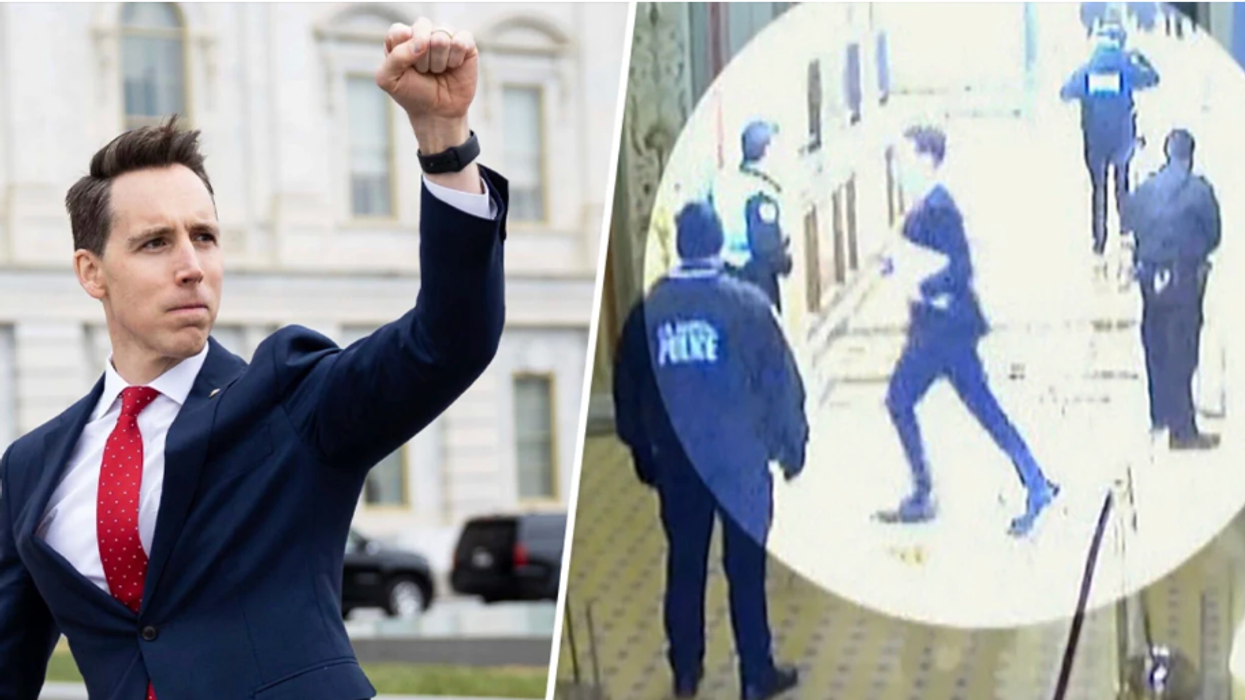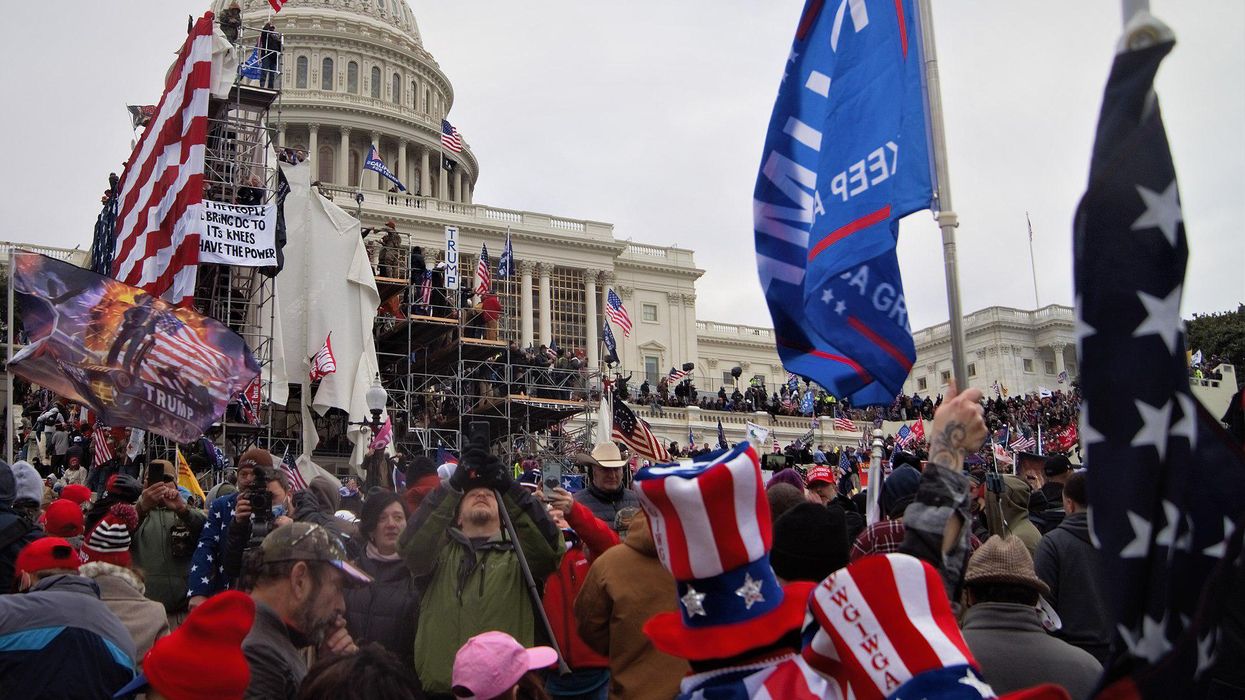'Worse Than Watergate'? MAGA Right Rewrites January 6 To Erase Trump Coup
The MAGA right’s cynical effort to rewrite the history of January 6 reached a new but seemingly inevitable low this week, as right-wing media figures, the GOP, and the Trump administration teamed up to demand retribution against those who attempted to impose consequences on the perpetrators of the event.
In late 2020, President Donald Trump and his allies in the Republican Party and right-wing media attempted to overturn the results of the election that he had lost, using false claims of widespread voter fraud. That campaign’s final phase relied on Vice President Mike Pence to refuse to certify the electoral count based on a nonsensical legal theory. When it became clear Pence would not cooperate, a mob of Trumpists — summoned to Washington, D.C., by the president who told them “we will never concede” — assaulted scores of law enforcement officers as they stormed the U.S. Capitol, sending Pence and the assembled Congress into hiding and delaying the counting of electoral votes.
This January 6 insurrection faced widespread public condemnation in its immediate aftermath. But right-wing propagandists, led by then-Fox star Tucker Carlson, went to work dismantling what turned out to be a fragile consensus. In the insidious counternarrative they created, January 6 was either righteous or something of a nothingburger, and the true scandal was the subsequent efforts to punish its perpetrators. Four years later, that version of events is the dominant one on the right, with special counsel Jack Smith’s indictment of Trump over his role treated as part of a Democratic plot. And as a result, efforts to achieve accountability for the crimes of January 6 have become partisan almost by definition.
Fox News star host Jesse Watters said the day after the storming of the U.S. Capitol that “people that think it wasn't that big of a deal” were wrong. “You can't smash windows, spray police with chemical agents, assault police officers, loot, and vandalize.”
But this week, Watters declared that “the Democrat reaction to January 6 was worse than January 6.” Watters pointed to the new revelation served up by Trump law enforcement appointees that Smith had received the phone records of several Republican senators from the period around January 6 as part of his criminal investigation of the events and baselessly concluded that “what they were probably trying to do is cast this wide net to create some grand criminal conspiracy and indict the entire Republican Party.”
Watters then demanded retribution against Smith and other federal law enforcement figures involved in the January 6 investigations. “This guy should be in prison,” he said. “And what they need to do is either appoint a special counsel or have some sort of Senate select committee to go up, do hearings, put Wray, put Garland, put Smith under oath, and if they lie, you throw them in prison.”
Legal reporters and experts have noted that seeking phone records of Republican officials who might have been in communication with Trump around the time of January 6 was an obvious step for the investigators, who ultimately indicted the president over what they alleged were attempts to use “unlawful means of discounting legitimate votes and subverting the election results.” But that conclusion presumes that investigators should have been investigating at all, and the current position of the Trumpist right is exactly as Watters pitched it: After Trump’s return to the presidency, he pardoned January 6 perpetrators and purged law enforcement who helped prosecute them.
On Tuesday night, Fox hosts and the Republican guests they hosted pushed falsehoods about Smith’s probe in order to justify retaliatory investigations into his effort. The sequence of events is roughly analogous to the crusade by Trump, congressional Republicans, and propaganda outlets like Fox to secure investigations into special counsel Robert Mueller’s probe of Russian interference in the 2016 election. That resulted in years of content for Fox’s stars — but the resulting four-year probe failed to garner prison time for a single person.
Here we go again.
Jack Smith did not “spy” on Republican senators in a scandal “worse than Watergate”
Fox stars Watters, Sean Hannity, and Laura Ingraham all used the same false characterization on Tuesday as they sought to stir up outrage about Smith’s January 6 probe.
Watters claimed that the “big story” was “that Joe Biden's FBI was spying on top Republican senators”; Sen. Josh Hawley, one of the senators whose records were included, subsequently told the host that the FBI “got wiretaps essentially” against them. Ingraham claimed the senators “were all spied on” in “an attempt at partisan surveillance.” According to Hannity, Smith had been “using the federal government to spy on several U.S. senators.”
Hannity and Ingraham also ran with with Senate Judiciary Committee Chair Chuck Grassley’s (R-IA) absurd characterization of the report as “WORSE THAN WATERGATE”: Ingraham termed it “arguably worse than Watergate,” while Hannity claimed more definitively that the report was “worse than anything alleged against Richard Nixon during Watergate.”
These claims are baseless and absurd.
The Watergate scandal featured operatives associated with Nixon’s reelection campaign attempting to break into the offices of the Democratic National Committee on the orders of a White House official, most likely in an effort to place equipment to actively surveil the president’s partisan opposition for explicitly political purposes. This is obviously very different from legitimate investigative steps taken as part of a duly promulgated criminal investigation.
And the FBI document at the root of the claim does not say anything about active or real-time surveillance — it references only a “preliminary toll analysis on limited toll records associated with” nine members of Congress.
The records were reportedly obtained from major telephone providers responding to a subpoena Smith obtained. And according to Grassley, the record the FBI reviewed “shows when and to whom a call is made, as well as the duration and general location data of the call” but “does not include the content of the call.”
Fox uses false premises to call for criminal investigations
All three shows featured calls for further investigations into Smith’s probe.
“It's time Pam Bondi appoint a special counsel to investigate Jack Smith, Merrick Garland, and Chris Wray,” Watters declared. “At the very least, we should have a Senate special select committee hold hearings and have these goons testify under oath, and if they lie to Congress, off to prison. As they said, no one is above the law.”
Hawley, in his interview with Watters, likewise called for “a special prosecutor who's going to go at this hard,” adding, “We need hearings in public. Put these people under oath. Start with Jack Smith. Let's hear from Merrick Garland. Let's hear from Christopher Wray -- and anybody who broke the law needs to be prosecuted.”
“I think the time has come for criminal prosecutions,” Sen. Eric Schmitt (R-MO) told Ingraham. “I think indictments should be coming here. We can't tolerate this and the Democrats try to act like President Trump's weaponizing. It's not what's happening.”
And on Hannity’s show, FBI Director Kash Patel declared that such probes were ongoing.
“We're just warming up,” he said. “But we are running our investigations to the ground. We are finding every single person involved. We will not leave a single room locked.”
“This is what Donald Trump was put in place to do,” he concluded. “And I'm honored to be his FBI director to lead this charge. And the men and women at the FBI, we're all in on this mission.”
That doesn’t include, of course, the FBI agents fired or reassigned because they worked January 6 cases. Because for this administration and the propagandists who support it, those who tried to get accountability for January 6 are the saga’s true villains.
Reprinted with permission from Media Matters













Trump Cabinet Nominee Withdraws Over (Sane) January 6 Comments
Kathleen Sgamma, President Donald Trump’s pick to head the Bureau of Land Management, sent shockwaves throughout Washington, D.C., on Thursday after withdrawing her name just hours before her confirmation hearing.
Republican Sen. Mike Lee of Utah announced Sgamma’s withdrawal at the start of the hearing, but Politico reported that her decision came after investigative outlet Documented published a 2021 memo where the oil and gas lobbyist condemned Trump’s role in spreading misinformation about the January 6, 2021, insurrection.
“I am disgusted by the violence I witnessed yesterday and President Trump’s role in spreading misinformation that incited it. I’m disgusted he discredited all the good work he did reorienting the judiciary back toward respect for the rule of law and constitution by dishonoring the vote of the People and the rulings of those very same judges on his numerous challenges,” the memo quotes Sgamma saying.
Sgamma likely withdrew her nomination not because she’s still upset with Trump, but because the leak of her past comments is embarrassing for both of them. After all, she knew about the Capitol attack when she was nominated and seemed totally on board with Trump’s energy agenda at the time.
While her comments about the insurrection were out of step with today’s GOP, they reflected the outrage that many Republicans shared in the immediate aftermath. And though Sgamma distanced herself from Trump at that time, she’s certainly no liberal—she even contributed to Project 2025.
Trump has continued defending the insurrectionists, calling them “patriots” and even pardoning them on Day 1 of his second term. He’s since doubled down on his false claims that the 2020 election was stolen, insisting that anyone who refuses to spread his lies is the real problem. And it seems that Sgamma has now bought into Trump’s propaganda.
“Unfortunately, at this time, I need to withdraw my nomination. I will continue to support President Trump and fight for his agenda to Unleash American Energy in the private sector,” Sgamma said in her resignation statement.
While some Republican senators told Politico they weren’t given a heads-up about the withdrawal, some Trump allies, including former Interior Secretary David Bernhardt, suggested that Sgamma’s withdrawal was inevitable.
“Individuals who know their views don’t align with the president… cause needless harm and conflict, hindering the president’s agenda,” he wrote on X.
Sgamma’s resignation marks the third Trump cabinet pick to either withdraw or have their nomination pulled.
Earlier, the White House backed off nominating Rep. Elise Stefanik of New York for United Nations ambassador, fearing losing a reliable GOP vote in their razor-thin House majority. Similarly, David Weldon’s nomination to lead the Centers for Disease Control and Prevention was pulled once it became clear he didn’t have the votes to get confirmed.
With the Bureau of Land Management overseeing energy production on federally owned lands—a key part of Trump’s second-term priorities—it remains to be seen whether his energy agenda will take another hit following Sgamma’s withdrawal.
While her decision may have been political, it also highlights the ongoing consequences of the insurrection, raising questions about whether there’s truly a divide between Trump and those who refuse to embrace his false election claims.
Reprinted with permission from Daily Kos.